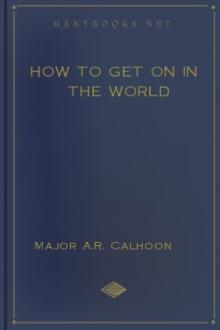How to Get on in the World - Alfred Rochefort Calhoun (bill gates book recommendations TXT) 📗

- Author: Alfred Rochefort Calhoun
- Performer: -
Book online «How to Get on in the World - Alfred Rochefort Calhoun (bill gates book recommendations TXT) 📗». Author Alfred Rochefort Calhoun
The accidental destruction of Sir Isaac Newton's papers, by his little dog "Diamond" upsetting a lighted taper upon his desk, by which the elaborate calculations of many years were in a moment destroyed, is a well-known anecdote, and need not be repeated: it is said that the loss caused the philosopher such profound grief that it seriously injured his health, and impaired his understanding. An accident of a somewhat similar kind happened to the manuscript of Mr. Carlyle's first volume of his "French Revolution." He had lent the manuscript to a literary neighbor to peruse. By some mischance, it had been left lying on the parlor floor, and become forgotten. Weeks ran on, and the historian sent for his work, the printers being loud for "copy." Inquiries were made, and it was found that the maid-of- all-work, finding what she conceived to be a bundle of waste paper on the floor, had used it to light the kitchen and parlor fires with! Such was the answer returned to Mr. Carlyle; and his feelings can be imagined. There was, however, no help for him but to set resolutely to work to rewrite the book; and he turned to it and did it. He had no draft and was compelled to rake up from his memory, facts, ideas, and expressions which had been long since dismissed. The composition of the book in the first instance had been a work of pleasure; the rewriting of it a second time was one of pain and anguish almost beyond belief. That he persevered and finished the volume under such circumstances, affords an instance of determination of purpose which has seldom been surpassed.
There is no walk in life, in which success has been won, that has not its brilliant examples of the achievements of perseverance. The literary life, in which all who read are interested, has many illustrations of this. No great career affords stronger proof of this than that of the great Sir Walter Scott, who, delighting his own generation, must be honored by all the generations that follow.
His admirable working qualities were trained in a lawyer's office, where he pursued for many years a sort of drudgery scarcely above that of a copying clerk. His daily dull routine made his evenings, which were his own, all the ore sweet; and he generally devoted them to reading and study. He himself attributed to his prosaic office discipline that habit of steady, sober diligence, in which mere literary men are so often found wanting. As a copying clerk he was allowed 3_d._ for every page containing a certain number of words; and he sometimes, by extra work, was able to copy as many as 120 pages in twenty-four hours, thus earning some 30_s._; out of which he would occasionally purchase an odd volume, otherwise beyond his means.
During his after-life Scott was wont to pride himself upon being a man of business, and he averred, in contradiction to what he called the cant of sonneteers, that there was no necessary connection between genius and an aversion or contempt for the common duties of life. On the contrary, he was of opinion that to spend some fair portion of every day in any matter-of-fact occupation was good for the higher faculties themselves in the upshot. While afterward acting as clerk to the Court of Session in Edinburgh, he performed his literary work chiefly before breakfast, attending the court during the day, where he authenticated registered deeds and writings of various kinds. "On the whole," says Lockhart, "it forms one of the most remarkable features in his history, that throughout the most active period of his literary career, he must have devoted a large proportion of his hours, during half at least of every year, to the conscientious discharge of professional duties." It was a principle of action which he laid down for himself, that he must earn his living by business, and not by literature. On one occasion he said, "I determined that literature should be my staff, not my crutch, and that the profits of my literary labor, however convenient otherwise, should not, if I could help it, become necessary to my ordinary expenses."
His punctuality was one of the most carefully cultivated of his habits, otherwise it had not been possible for him to get through so enormous an amount of literary labor. He mad it a rule to answer every letter received by him on the same day, except where inquiry and deliberation were requisite. Nothing else could have enabled him to keep abreast with the flood of communications that poured in upon him and sometimes put his good-nature to the severest test. It was his practice to rise by five o'clock and light his own fire. He shaved and dressed with deliberation, and was seated at his desk by six o'clock, with his papers arranged before him in the most accurate order, his works of reference marshaled round him on the floor, while at least one favorite dog lay watching his eye, outside the line of books. Thus by the time the family assembled for breakfast, between nine and ten, he had done enough—to use his own words—to break the neck of a day's work. But with all his diligent and indefatigable industry, and his immense knowledge, the result of may years' patient labor, Scott always spoke with the greatest diffidence of his own powers. On one occasion he said, "Throughout every part of my career I have felt pinched and hampered by my own ignorance."
But perseverance and effort do not always mean successful work. Freeman Hunt distinguishes admirably between activity and energy in the following statement, which it would be well to remember:
"There are some men whose failure to succeed in life is a problem to others, as well as to themselves. They are industrious, prudent, and economical; yet, after a long life of striving, old age finds them still poor. They complain of ill-luck; they say fate is against them. But the real truth is that their projects miscarry because they mistake mere activity for energy. Confounding two things essentially different, they suppose that if they are always busy, they must of a necessity be advancing their fortune; forgetting that labor misdirected is but a waste of activity."
"The person who would succeed in life is like a marksman firing at a target—if his shot misses the mark, it is but a waste of powder; to be of any service at all, it must tell in the bull's eye or near it. So, in the great game of life, what a man does must be made to count, or it had almost as well be left undone.
"The idle warrior, cut from a block of wood, who fights the air on the top of a weather-cock, instead of being made to turn some machine commensurate with his strength, is not more worthless than the merely active man who, though busy from sunrise to sunset, dissipates his labor on trifles, when he ought skillfully to concentrate it on some great end.
"Every person knows some one in his circle of acquaintance who, though always active, has this want of energy. The distemper, if we may call it such, exhibits itself in various ways. In some cases, the man has merely an executive faculty when he should have a directing one; in other words, he makes a capital clerk for himself, when he ought to do the thinking work for the establishment. In other cases, what is done is either not done at the right time, or not in the right way. Sometimes there is no distinction made between objects of different magnitudes, and as much labor is bestowed on a trivial affair as on a matter of great moment.
"Energy, correctly understood, is activity proportioned to the end. The first Napoleon would often, when in a campaign, remain for days without undressing himself, now galloping from point to point, now dictating dispatches, now studying maps and directing operations. But his periods of repose, when the crisis was over, were generally as protracted as his previous exertions had been. He has been known to sleep for eighteen hours without waking. Second-rate men, slaves of tape and routine, while they would fall short of the superhuman exertions of the great emperor, would have considered themselves lost beyond hope if they imitated what they call his indolence. They are capital illustrations of activity, keeping up their monotonous jog- trot for ever; while Napoleon, with his gigantic industry, alternating with such apparent idleness, is an example of energy.
"We do not mean to imply that chronic indolence, if relieved occasionally by spasmodic fits of industry, is to be recommended. Men who have this character run into the opposite extreme of that which we have been stigmatizing, and fail as invariably of securing success in life. To call their occasional periods of application energy, would be a sad misnomer. Such persons, indeed, are but civilized savages, so to speak; vagabonds at heart in their secret hatred of work, and only resorting to labor occasionally, like the wild Indian who, after lying for weeks about his hut, is roused by sheer hunger to start on a hunting excursion. Real energy is persevering, steady, disciplined. It never either loses sight of the object to be accomplished, or intermits its exertions while there is a possibility of success. Napoleon on the plains of Champagne, sometimes fighting two battles in one day, first defeating the Russians and then turning on the Austrians, is an illustration of this energy. The Duke of Brunswick, idling away precious time when he invaded France at the outbreak of the first Revolution, is an example of the contrary. Activity beats about a cover like an untrained dog, never lighting on the covey. Energy goes straight to the bird at once and captures it."
CHAPTER XVII SUCCESS BUT SELDOM ACCIDENTAL.A man may leap into sudden fortune at a bound, and without effort or foresight, but it is doubtful if any great permanent success ever was the outcome of blind chance.
The old adage, "Trust to luck," like many other adages that time has kept in unmerited circulation, is a bad one. The man who trusts to luck for his clothing is apt to wear rags, and he who depends on it for food is sure to go hungry.
We hear a great deal about the wonderful things that have been done by chance, but we seldom take the time to examine them. We read that sir Isaac Newton, sitting in his garden one day, "Chanced to see an apple fall to the ground," and this set him to thinking, and he discovered the laws of gravitation. New, ever since the first apple fell from the first tree in Eden, men have been watching that very commonplace occurrence. We might extend the field so as to embrace oranges, coconuts and all the fruits and nuts which, in every land and through all the long centuries of man's existence, have been falling to the ground—not by chance, however, yet they set no men to thinking, simply because not one of the millions of men who "chanced" to see the incident, "chanced" to have the reasoning powers of the great English scientist. If the apple, instead of falling to the ground, had shot up, without visible cause, to





Comments (0)